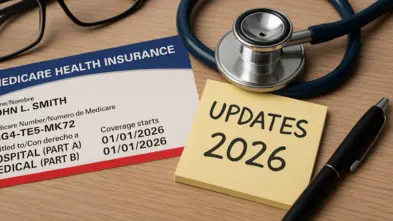Medicare 2026: Changes That Affect You

Medicare is making several updates for 2026 that could affect your coverage, benefits, and out-of-pocket costs. Some changes are new rules from Medicare, while others are the result of special programs ending.
Premiums and deductibles for 2026 for Parts A & B have not been announced yet; Medicare usually releases these in late October, and we will update this article when the information is available.
Currently, the projected costs are:
- Part A Hospital Deductible: $1,716 per benefit period
- Part B: Premium $206.50/month; Deductible $288
The 2026 Part D amounts are set: the yearly out of pocket cap is $2,100 and the standard deductible limit is $615.
Here’s what you need to know now so you can prepare before Open Enrollment (Oct 15 - Dec 7).
Parts A & B: What’s new for Original Medicare in 2026?
One new change for 2026 is that Medicare will begin testing prior authorization for certain outpatient services in six states.

TURNING 65 SOON?
Learn the Medicare basicsPart B Prior authorization pilot starts in six states
In 2026, Medicare will test prior authorization for selected outpatient services in six states. The model is called WISeR (Wasteful and Inappropriate Service Reduction) and runs six performance years, beginning January 1, 2026. Reviews may use technology including artificial intelligence and machine learning, but licensed clinicians make final decisions. Emergency care and inpatient-only services are excluded.
What is prior authorization?
Prior authorization is an approval your doctor’s office gets from Medicare before you have certain tests or procedures. It helps confirm the service is medically necessary.
Where will it apply in 2026?
Following are the six pilot states chosen for rollout in 2026:
- Arizona
- New Jersey
- Ohio
- Oklahoma
- Texas
- Washington
Which services will need prior authorization in 2026?
The pilot will focus on a short list of outpatient procedures that include:
- Knee arthroscopy for osteoarthritis
- Implantation of spinal cord stimulators for chronic pain
- Implantation of peripheral nerve stimulators
- Application of skin or tissue substitutes for certain chronic wounds
Your doctor’s office will know whether your service is on this list.
How could this affect me?
- Your appointment date may depend on getting approval first.
- Your doctor’s office handles the paperwork, not you.
- If a request is denied, you have appeal rights.
What should I do?
- If you live in one of the six states, ask your doctor’s office whether your service needs approval.
- Keep any letters from Medicare with your records.
- Call your provider if you have not heard about an approval and your appointment is approaching.
If you do not live in one of these six states, as of now, this 2026 Part B pilot is not scheduled to apply to you.
Part C: What Changes Are Coming to Medicare Advantage Plans?
In 2026, several changes to Medicare Advantage plans could affect the benefits you receive and how certain extras are offered.
Some updates are the result of the end of a special Medicare program, while others come from new CMS rules on supplemental benefits and changes in how coverage works for some people who have both Medicare and Medicaid. Your plan will explain any changes in your Annual Notice of Change (ANOC) in September, but here’s what to know now.

LOOKING TO LEARN ABOUT MEDICARE ADVANTAGE?
Explore Medicare Advantage Plans1. Some extra benefits may change or end
If you have a Medicare Advantage plan, you may have enjoyed extra perks this year — like lower copays for certain services or medications, gift cards for staying on track with prescriptions, or added help with food, transportation, housing, or utilities. These benefits have been available because of a special Medicare program called the Value-Based Insurance Design (VBID) model.
The program will end on December 31, 2025, and plans will no longer have the same authority to offer those VBID-only perks. As a result, some of these extras may change, be reduced, or go away in 2026.
Benefits that could change or end
- Lower copays for certain services available only to people with specific health conditions may go back to the plan’s regular amounts.
- Lower copays for some prescription drugs available only to targeted members could end.
- Gift cards or rewards for medication use may no longer be offered.
- Extra help with food, transportation, housing, or utilities tied to the VBID program could be reduced or offered in a different form.
Benefits that are likely to remain
Most standard Medicare Advantage extras — like dental, vision, hearing, transportation, meals after a hospital stay, and some chronic-condition supports — are allowed under regular Medicare Advantage rules and can continue in 2026. Availability varies by plan and service area; check your plan’s Evidence of Coverage (EOC).
What you should do
- Check your Annual Notice of Change (ANOC) in September to see if any benefits you use now will be different in 2026.
- Ask your plan specifically about any copay reductions, drug cost breaks, rewards, or extra supports you rely on.
- If something important is ending, compare other plan options during the Open Enrollment Period (Oct 15–Dec 7).
2. Limits on SSBCI items
Starting in 2026, CMS will place limits on what can be offered as SSBCI (Special Supplemental Benefits for the Chronically Ill) under Medicare Advantage plans. These benefits are intended to help manage chronic conditions and must have a reasonable expectation of maintaining or improving a person’s health or function. The new rules are designed to ensure that SSBCI dollars are spent on services and items that truly support health, rather than on unrelated perks or products.
Items and services that cannot be offered as SSBCI in 2026 include:
- Alcohol
- Tobacco
- Cannabis products
- Life insurance
- Hospital indemnity insurance
- Funeral or burial expenses
- Broad membership discount programs (e.g., general shopping clubs)
- Non-healthy food (defined by CMS as items high in added sugar, sodium, or saturated fat that do not meet federal nutrition standards)

Food benefits under SSBCI will need to align with nutritional standards, such as those set by the U.S. Dietary Guidelines, to qualify. Meals and grocery items should support specific health goals related to the chronic condition(s) being managed.
3. Dual eligible enrollees in some states will move to integrated D-SNPs
As states wind down Medicare-Medicaid Plans, many remaining enrollees will transition to integrated Dual Eligible Special Needs Plans (D-SNPs) for 2026 under state and CMS transition plans. Watch for official letters if you are dually eligible.

WANT TO LEARN MORE ABOUT DUAL ELIGIBILITY?
Understand your benefits as a dual eligibleEnjoying this article?
Follow us for more tips and insights!
Part D: What is Changing in Prescription Drug Coverage?
Several updates take effect in 2026 that can affect what you pay for prescriptions and the maximum you can spend in a year. Some changes will lower the price you pay for certain high-cost drugs, others will adjust yearly limits and deductibles, and one will make it easier to stay enrolled in Medicare’s monthly payment option.

QUESTIONS ABOUT MEDICARE PART D?
Learn about Prescription Drug Plans1. Yearly out-of-pocket cap going up to $2,100
In 2026, the most you can spend out of pocket on covered Part D drugs will be $2,100, which is $100 higher than the 2025 limit of $2,000. Once you reach this cap, you will pay $0 for covered drugs for the rest of the year.
2. Standard Part D deductible limit will rise to $615
The maximum deductible under the standard Part D benefit will increase to $615 in 2026, which is $25 higher than the 2025 limit of $590. Plans can offer a lower deductible but cannot exceed this amount.
3. Lower prices may apply to certain negotiated drugs
Starting January 1, 2026, Medicare’s first set of negotiated “Maximum Fair Prices” applies to these 10 Part D drugs:
- Eliquis (apixaban)
- Jardiance (empagliflozin)
- Xarelto (rivaroxaban)
- Januvia (sitagliptin)
- Farxiga (dapagliflozin)
- Entresto (sacubitril/valsartan)
- Enbrel (etanercept)
- Imbruvica (ibrutinib)
- Stelara (ustekinumab)
- Fiasp / NovoLog insulin aspart products (Fiasp, Fiasp FlexTouch, Fiasp PenFill, NovoLog, NovoLog FlexPen, NovoLog PenFill)
Source: Centers for Medicare & Medicaid Services (CMS), “Selected Drugs for the Medicare Drug Price Negotiation Program, Initial Price Applicability Year 2026.”
If you take one of these medications, your share of the cost will be based on the negotiated price. Only drugs on this list qualify in 2026. Medicare plans to add more drugs in later years under the program timeline.

LOOKING FOR HELP WITH DRUG COSTS?
Learn about Medicare's Extra Help4. Insulin costs will follow a new “lesser-of” rule
In 2025, a one-month supply of covered Part D insulin costs no more than $35. Starting in 2026, your cost for a month’s supply will be whichever is lowest of:
- $35
- 25% of the drug’s Medicare-negotiated Maximum Fair Price
- 25% of your plan’s negotiated price
The deductible will not apply to covered insulin.
5. Prescription Payment Plan will renew automatically
The Prescription Payment Plan (PPP) lets you spread your out-of-pocket prescription costs evenly over the year instead of paying large amounts all at once. Starting in 2026, your enrollment will automatically renew unless you opt out. Plans must process opt-out requests within three calendar days and provide clearer notices and online instructions.

Since 2023, vaccines recommended by ACIP — a group of medical experts that advises the CDC on adult immunizations — such as shingles, pneumonia, and flu, have been covered under Part D at no cost. This coverage will continue in 2026 with no change from 2025.
Summary of Changes
For 2026, Medicare is introducing updates that could affect your coverage, benefits, and costs:
- Part B: New prior authorization pilot in six states for select outpatient services.
- Part C (Medicare Advantage): Possible reduction or loss of some extra benefits with the end of the VBID program, new limits on SSBCI items, and changes for some people with both Medicare and Medicaid.
- Part D: Higher annual out-of-pocket cap and deductible, lower prices for certain high-cost drugs, new insulin cost rule, and automatic renewal for the Prescription Payment Plan.
Review your Annual Notice of Change (ANOC) in September, ask your plan about any benefits you rely on, and be ready to compare options during Open Enrollment Period (October 15–December 7).

LOOKING FOR MEDICARE ENROLLMENT PERIODS?
View Enrollment Periods & DeadlinesHow Hesteon Solutions Can Help You
At Hesteon Solutions, we help Medicare beneficiaries make informed decisions about their coverage. Our licensed agents work with you to review your current benefits, assess your healthcare and prescription needs, and explain the plan options available in your area.
We provide clear, straightforward guidance so you can feel confident your Medicare coverage fits your needs and budget. Whether you are new to Medicare or considering a change, we are here to make the process easier.
Call us today to schedule your free consultation.
Follow us for the latest updates!
Receive Medicare news, current senior health trends, and helpful tips delivered to your newsfeed.
